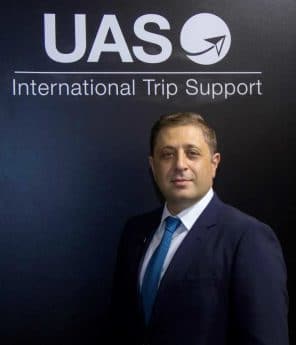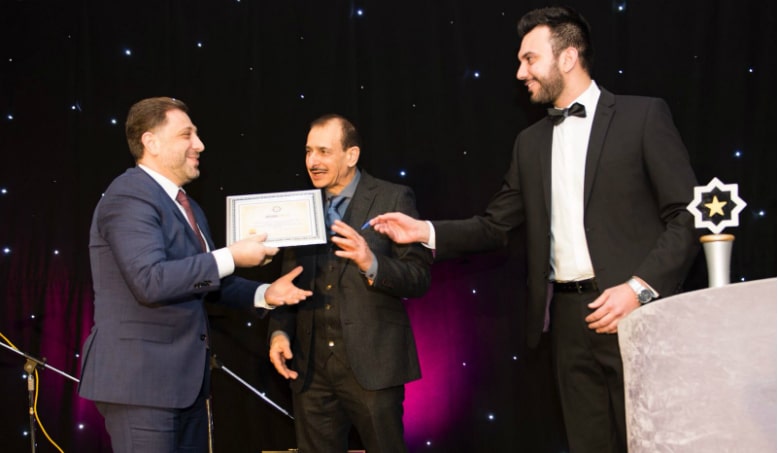Hult Global Executive MBA alum, serial entrepreneur, and co-founder and CEO of UAS International Trip Support, Omar Hosari has been named one of the top 100 Arab CEOs and honored with an Arab Best Award for Leadership.
The annual Arab Best ceremony, which took place in London last month, was first launched in 2016 to recognize outstanding achievement in the world of business, sports, and within the community. The awards were initiated by Abdulla Abdul Karim, CEO of Qubalal du Trop Group, with winners selected by a committee of experts representing a range of sectors.
Recognition by Arab Best is a testament to Omar’s inspirational leadership style and exceptional hard work. He’s driven the growth of UAS from a startup in 2000 to an international organization at the forefront of aviation services today. Beyond UAS, Omar has founded and leads other ventures in industries as diverse as construction, chocolate, and children’s toys.
We spoke to Omar to find out more about what makes a good leader and how he managed to balance his successful business with his studies.


In your opinion, what is the most important characteristic of a good leader? Why?
There are many crucial characteristics that determine a good leader. Having a clear vision, a strong work ethic, exceptional self-motivation and persistence, and a massive belief in your mission are all fundamental for any leader to be successful.
However, there is a uniting force for all of these individual characteristics, without which they become ineffective. What truly makes a good leader is the literal meaning of the word lead: they go first.
Great leaders inspire by taking the first steps and being unafraid to go into new territory. This is why people trust them and follow them. It’s a courageousness that transcends anything personal—it’s all about the collective, the organization, the family.
In my opinion, it’s the willingness and ability to go first that is the most important characteristic of a good leader.
“Great leaders inspire by taking the first steps and being unafraid to go into new territory.”
Why did you decide to pursue an EMBA?
I come from an extremely industrious family—entrepreneurship is in my blood. I’ve been lucky enough to enjoy success at a young age, however, I’m never complacent and I believe that there is always room for improvement.
My inspiration is always to better myself further, and to keep my senses and business acumen as sharp as possible. The EMBA was part of this process of constant self-development and improvement.
How were you able to balance a successful global business with your studies at Hult?
It was a personal goal of mine to achieve an EMBA. Like all goals, once we have committed to them, we find a way to make them a reality.
As CEO of a global organization, travel is a large part of my role. It was vital for me to find a balance between my professional leadership obligations and having time to study. In this sense, having the ability to attend multiple campuses was a great advantage.
From the academic side, my daily use of analytical thinking, strategic planning, and negotiation skills meant that while I was studying the theory, I was simultaneously practicing.
I think the most valuable lesson I learned is that we can always push ourselves more. The only limitations on our capabilities are the ones we choose to impose on ourselves.
What advice would you give to an aspiring entrepreneur?
My advice is to roll with the punches and follow your instincts. You will encounter a lot of challenges, but you need to embrace them. And embrace failure for its potential to teach you the valuable lessons that lead to success. Stay out of your comfort zone—success doesn’t happen when we are not pushed to our limits.
Being an entrepreneur is about being resourceful and innovative and finding better ways of doing things. However, be prepared that sometimes things won’t work out as you planned or hoped. Use these disappointments as motivation, and make persistence your constant companion. If you give up, you will never succeed.
Finally, be proud of your achievements but don’t let them define you—it’s where you’re going that matters, not where you’ve been.
“Embrace failure for its potential to teach you the valuable lessons that lead to success.”
You’re currently training to climb Everest—what was your inspiration?
I’ve always wanted to conquer Mount Everest—it’s been a dream of mine since childhood. As I said earlier, I believe leadership begins at the front, so my inspiration in attempting this is to motivate others.
This month, in preparation for eventually taking on Everest, I will travel to the Nepalese Himalayas to climb Island Peak. It’s about 6,200 meters above sea level, so I’m expecting a challenge. All in all, it’ll be a trip of almost three weeks of intensive physical and mental exertion.
I’ve always understood that success is not easy. And it takes more than hard work—it takes perseverance, patience, and grit. I think getting through this challenge will demand all of these attributes, and I truly hope I can inspire those around me to rise to challenges and get out of their comfort zone. I want to empower others to push themselves to the limit.
“I believe leadership begins at the front. I truly hope I can inspire those around me to rise to challenges and get out of their comfort zone.”
To learn more about our Global Executive MBA program and the leadership skills you can gain, download a brochure.
Make the most of what your career has to offer with a Masters in International Business from Hult. To learn more, take a look at our blog How to stay on track and achieve your goals at Hult, or give your employability a huge boost with an MBA in international business. Download a brochure or get in touch today to find out how Hult can help you to explore everything about the business world, the future, and yourself.


